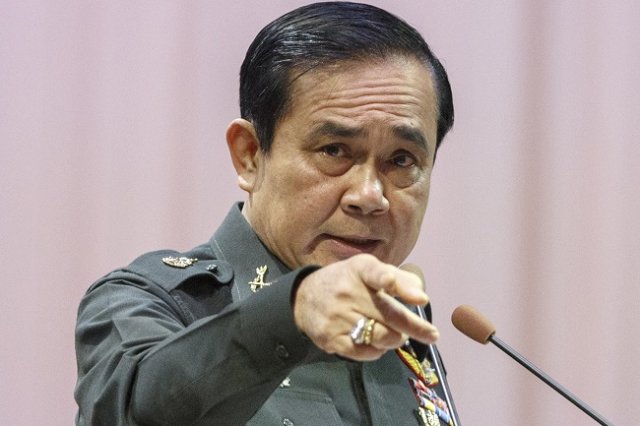
Thailand's military junta’s new draft constitution is a pathetic, backward, anti-democratic and infantile document.
Just like the rantings of generalissimo Prayut Chan-ocha, the regime's prime minister, it is full of tub-thumping and shouting about the “duties” and “responsibilities” of Thai people to grovel to “Nation, Religion and King”.
It is infantile because it is written by conservatives who think that by bullying the population into conforming to elite beliefs, they can actually change peoples’ attitudes.
The infantilism gets worse when we get to part two of the constitution, which is headed: “Good Political Leaders and Good Representatives”. It doesn’t take much to guess what the junta’s definition of “good” might be.
High up on the list is loyalty to “Nation, Religion and King” and not being corrupt. The whole thing sounds like some morality tale designed for a bad kindergarten.
Worse still, the constitution sets out a new unelected committee called the “National Morals Forum”. This appointed group of junta loyalists will have unlimited powers to weed out “unsuitable” politicians, making sure they do not stand for elections, and it will have the power to veto policies and start impeachment processes.
This “National Morals Forum” is similar to the “fatherland or patriotic committees” in Vietnam today or those in Indonesia under the Suharto dictatorship, which selected suitable politicians for the people to then “choose” between.
It should be stated that those who were involved in the cold-blooded murder of pro-democracy demonstrators in 2010 and those who staged military coups to overthrow elected governments and destroy constitutions are not deemed “bad” people.
It is these “good” state criminals and military gangsters who propose in the constitution that the state “educate” the public in democratic principles.
The constitution is highly undemocratic because it gives power to the “National Morals Forum”. But added to this is the fact that article 172 allows for someone not an elected member of parliament to become prime minister.
In 1992, many democracy activists sacrificed their lives on the streets of Bangkok to uphold the principle that the prime minister must be an elected member of parliament.
The senate will be unelected. Just under half will be “elected” in a sham election where there will be a “choice” of 10 “suitable” candidates per province, selected by the elites, for the people to choose. The candidate with most votes will become the senator. The rest of the senate will be appointed by pro-military elite interest groups.
The lower house of parliament will be elected by a complicated method involving tinkering about with the numbers of constituency and party list MPs. Large, popular parties such as Pheu Thai, which led the government overthrown in the military coup in May last year, will be discriminated against. They will have the number of their party list MPs reduced if they win “too many” constituencies.
Small, unpopular parties, such as the right-wing, pro-coup Democrat Party, will be given extra party-list MPs. The hope is that this will ensure governments will be weak and less stable, forced to rely on coalitions.
Politicians who have suffered bans on their political activity, almost exclusively from Pheu Thai, will be barred from all elections under this draft constitution.
Governments and politicians who design pro-poor policies that are deemed to be “not in the interest of the nation” can be punished and removed from office under Article 205. Article 30 also allows governments to use the excuse that “there is no money” to flout the constitutional rights of the people to access education, health and other benefits.
Some people have become excited by the fact that the constitution allows for the possibility that Thailand could have a woman as the royal head of state. In fact, this has been in the constitution since 2007 and only becomes one possible choice if the king dies and has not appointed a successor. This is not the case today as the crown prince is the king’s appointed successor.
This is possibly the worst constitution that has ever been drafted in Thailand. It should be opposed.
[Slightly abridged from Red Thai Socialist. Giles Ji Ungpakorn is a political commentator and dissident. In February 2009 he was forced into exile from Thailand after he was charged with lese majeste (insulting the monarch) for writing a book criticising a 2006 military coup.]
Like the article? Subscribe to Green Left now! You can also like us on Facebook and follow us on Twitter.